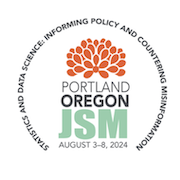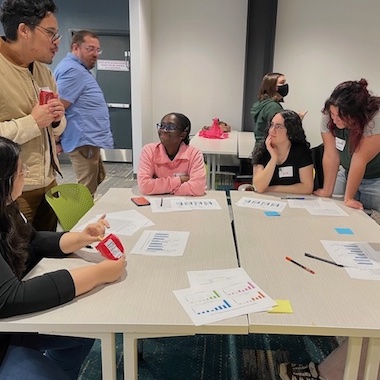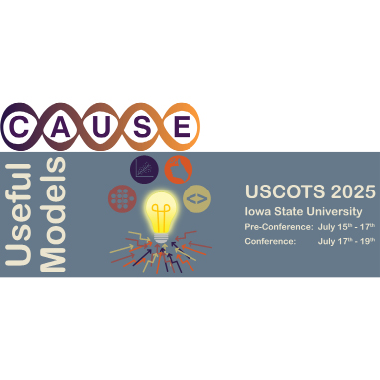PRIME at the Joint Statistical Meetings
 Dr. Jenny Green and second-year math ed doctoral student, Maria Cruciani, from PRIME
presented at the Joint Statistical Meetings (JSM) in Portland, Oregon in early August.
Dr. Jenny Green and second-year math ed doctoral student, Maria Cruciani, from PRIME
presented at the Joint Statistical Meetings (JSM) in Portland, Oregon in early August.
The JSM is the largest gathering of statisticians and data scientists in North America, with over 5,000 in attendance. It provides a unique opportunity for statisticians in academia, industry and government to exchange ideas and explore opportunities for collaboration.
 Jenny (at left) and Maria shared a presentation and a poster on their research project
in PRIME, GTAs-LEAD, with colleagues from North Carolina State University—one of whom,
Sunghwan Byun, is a graduate of our PRIME doctoral program.
Jenny (at left) and Maria shared a presentation and a poster on their research project
in PRIME, GTAs-LEAD, with colleagues from North Carolina State University—one of whom,
Sunghwan Byun, is a graduate of our PRIME doctoral program.
The first session they presented was a speed and poster session, titled: Authentic Data Explorations: Investigating the Normal Distribution through Comparative Rent Data. The session description appears below this article.
 Maria (at left) commented, “The second session was a topic contributed session which
Jenny organized and I chaired, titled: Empowering Educators: Supporting Equitable Teaching of Data Science Across Grades
K-16. Within the session, our presentation was: GTAs' Problems of Practice for Teaching Introductory Statistic Courses.” A description of this session also appears below.
Maria (at left) commented, “The second session was a topic contributed session which
Jenny organized and I chaired, titled: Empowering Educators: Supporting Equitable Teaching of Data Science Across Grades
K-16. Within the session, our presentation was: GTAs' Problems of Practice for Teaching Introductory Statistic Courses.” A description of this session also appears below.
The next JSM annual meeting will be held August 2-7, 2025 in Nashville, TN.
PRIME sessions at the JSM
Authentic Data Explorations: Investigating the Normal Distribution through Comparative Rent Data
Inquiry-based activities allow students to explore questions they find interesting and applicable, motivating deeper engagement in a given task. Authentic data situates inquiry-based statistical explorations in meaningful contexts and advances the development of students' data acumen. We have designed an inquiry-based activity that authentically explores the distributions of rent measured as a percentage of income across the United States. It is the first activity in a series of three that offers students rich experiences exploring questions about authentic data through R Shiny applets. The activity's goal is to strengthen students' data exploration skills while furthering their understanding of the normal distribution. The learning objectives of calculating, interpreting, and drawing conclusions from z-scores, percentiles, and proportions in addition to standardizing and comparing normally distributed data are met. Statistical literacy is fostered as students become aware of social phenomena that are modeled by statistics and are situated in a context of societal and personal importance. Students will learn to standardize and compare normally distributed data in a context that is relevant to their lives, will gain experience taking the lead on statistically investigating a question that is interesting to them, and will practice communicating their results to others. This activity and the R Shiny applet will be discussed to demonstrate ways to situate statistical tasks in meaningful contexts.
Authors:
Maria Cruciani, Michigan State University
Justin Post, North Carolina State University
Jennifer Green, Michigan State University
Sunghwan Byun, North Carolina State University
GTAs' Problems of Practice for Teaching Introductory Statistic Courses
Statistics graduate teaching assistants (GTAs) play key roles in undergraduate statistics education, especially at the introductory level. In large university settings, introductory statistics courses and recitation sessions are often taught by GTAs. Supporting GTAs in implementing instructional recommendations (e.g., GAISE College Report) is an important issue. One of the initial steps toward this effort is identifying key areas of support for GTAs. To do so, we conducted a study on problems of practice perceived by statistics GTAs during professional development that was embedded in GTAs' instructor and mentoring meetings. The professional development included modules with the goal of teaching equitably with authentic data. Based on the data gathered from interviews and recordings from the professional development meetings in two GTA communities, we discuss thematic categories of problems of practice experienced by GTAs. These categories could inform the field in guiding what efforts are needed to better support GTAs to teach equitably with authentic data.
Authors:
Sunghwan Byun, North Carolina State University
Jennifer Green, Michigan State University
Justin Post, North Carolina State University
Maria Cruciani, Michigan State University
Matthew Ferrell, North Carolina State University



